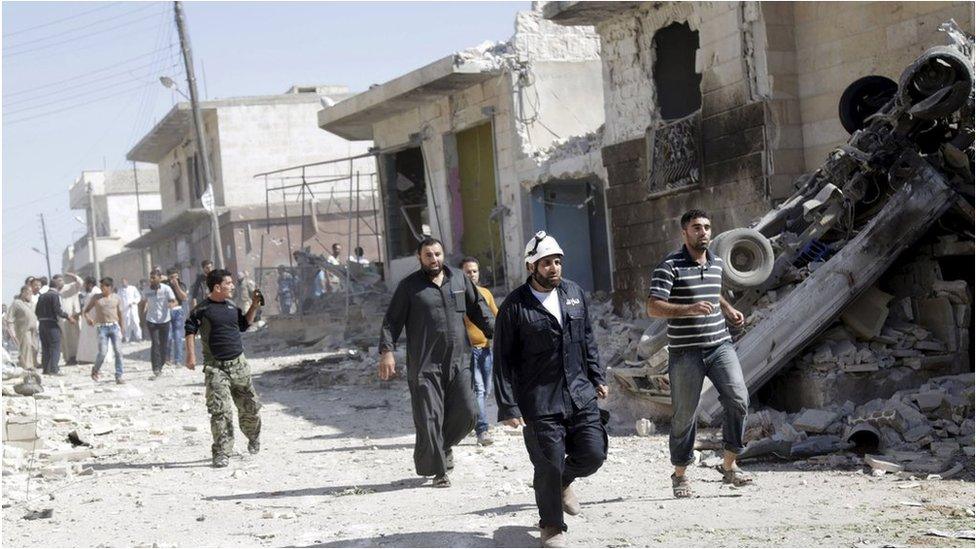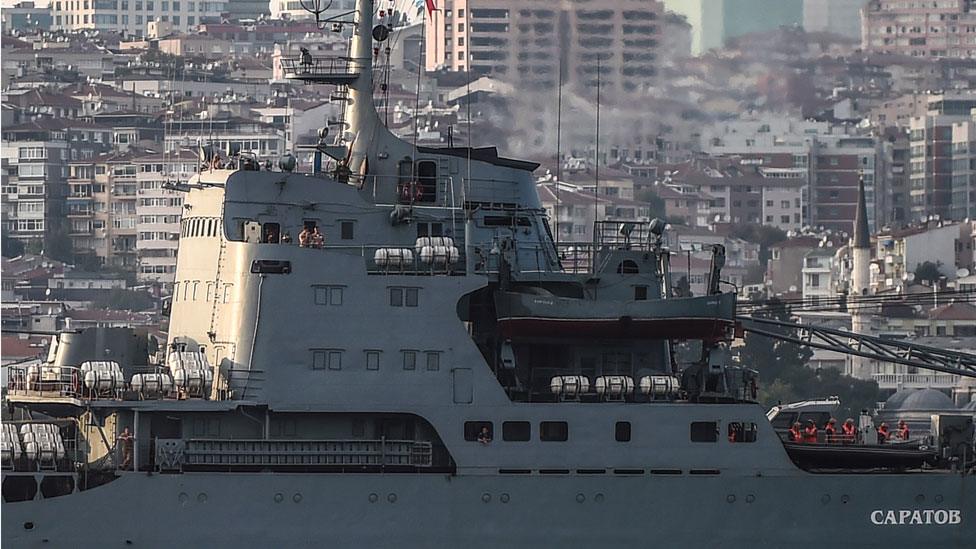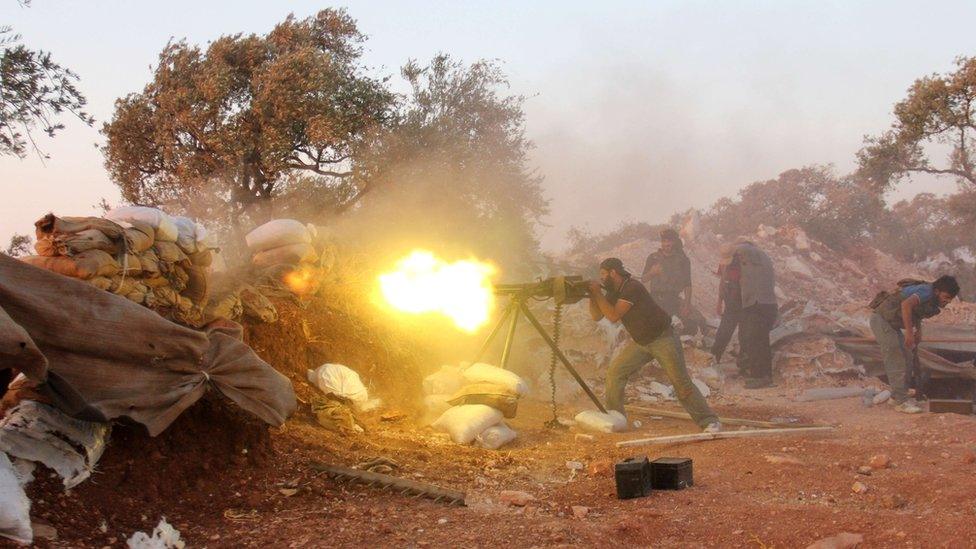Viewpoint: West 'walking into abyss' on Syria
- Published

While much of the world's focus has been on IS, the Syrian government has continued inflicting casualties with airstrikes
Once again, Syria is making the headlines. As tens of thousands of desperate Syrians embark on their perilous journeys towards Europe, policymakers in the West are faced with yet another unintended consequence of their failure to resolutely end a conflict that has now killed more than 250,000 people and displaced 11 million others.
Amid this chaos, Russia is embarking on its second offensive foreign military operation in 18 months. In the space of three weeks, Moscow has deployed at least 28 fighter jets, 14 helicopters, dozens of tanks, anti-aircraft missile systems and 2,000 troops into north-western Syria.
Russia's claim that its forces are there only to target Islamic State should be taken with a large grain of salt. While it is clearly hostile to jihadists, Moscow is well-known for viewing Syria's entire armed opposition as uniformly Islamist and a danger to international security.
While al-Qaeda, IS and other like-minded groups have certainly consolidated themselves as powerful actors in Syria, such sweeping assessments are patently false.

Russia has caused alarm among Western governments by sending warships to the Mediterranean for military exercises
Unfortunately, Russia's intervention comes as US policy on Syria has fallen to an all-time low. After its first batch of "trained and equipped" rebels were kidnapped, killed and forced to flee by al-Qaeda in late July, its second batch handed al-Qaeda half their vehicles and 25% of their ammunition upon entering the country several days ago.
To label the mission a catastrophic failure would be a generous assessment.
Meanwhile, the US and its European partners remain dangerously disconnected from Syria's realities. The threat posed by IS has become a convenient obsession, while the more complex dynamics in the rest of the country appear all but ignored and misunderstood.
This isolation has been most clearly revealed in recent statements in which US and European policymakers have suggested they may no longer see Bashar al-Assad's immediate departure as an integral part of a solution to the Syrian crisis.
While this may not necessarily seem illogical to a casual observer, it ignores the fact that well over 100,000 Syrian men currently fighting the Assad regime have sworn to do so until he is removed from power.

Many of those seeking a better life in Europe are fleeing Syria's conflict
Amid recent geopolitical machinations, one simple reality appears to have been forgotten or purposefully ignored: Assad is not and should never be seen as a better alternative to IS.
From the very first days of the revolution, Assad and his intelligence apparatus have consistently facilitated the rise of jihadists. This policy of aiding and abetting jihadist militants and manipulating them for Damascus' policy interests is a well-established Assad family practice, dating back at least to the 1990s.
By releasing dozens of al-Qaeda prisoners in mid-2011, Assad helped give birth to a thriving Islamist insurgency, including an al-Qaeda affiliate. By then adopting a deliberate policy of not targeting IS, Assad directly facilitated that group's recovery and explosion into the transnational "Caliphate" movement it claims to be today.
Meanwhile, the Assad regime has conducted a consistent policy of intentional mass killing of civilians - first with air strikes and ballistic missiles, then with barrel bombs and widely alleged use of chemical weapons.
Bashar al-Assad has professionalised and industrialised the use of detention and torture to "cleanse" his own population, while imposing dozens of medieval-style sieges on vulnerable populations. He has consistently flouted UN Security Council resolutions and according to some sources, has been responsible for 95% of all 111,000 civilian deaths since 2011.

Much of the armed opposition has been trying to become more united politically
IS remains a potent force in Syria and must be countered, but it will not be marching on Damascus anytime soon, contrary to some uninformed fear mongering. Al-Qaeda also poses a pressing and more long-term threat, perhaps more so than has been acknowledged. But at the end of the day, the root cause of the entire Syrian crisis is Assad and his regime.
While an unenviable challenge, it remains the international community's moral and political responsibility to find a solution in Syria that ensures the best chance of a sustainable peace. This means genuinely engaging with Syrians of all stripes, including the armed opposition and incorporating their views into a potential solution.
Contrary to popular opinion, the Syrian armed opposition is not divided, but has in fact spent much of the past year focused on developing a clear and unified political vision. These are all groups composed of and led by Syrians and which explicitly limit their objectives to within Syria's national boundaries - not IS and roughly a dozen Al-Qaeda-linked factions.
Simply put, this amounts to a core of roughly 100 factions. Amid the threat of being excluded from determining their country's future, dozens of the most powerful of these armed groups are now negotiating the establishment of a single "political office".
Western governments are ignoring the armed opposition at our own peril.
While accommodating Russian and Iranian demands for Assad's survival and potentially even a de facto partition of the country may seem like an attainable objective, this will only prolong and intensify the conflict and will almost certainly spark a jihadist mobilization the like of which the world has never seen.
The vast majority of refugees now entering Europe are fleeing Assad's murder machine, not IS or al-Qaeda. Ever since Syrians took to the streets in March 2011, the Western response has been both feeble and noncommittal, but the world is now in need of real leadership. Unfortunately, it seems our leaders are walking into the abyss with their eyes closed.